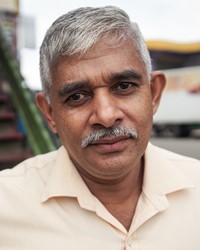Sinhalese in Brunei

Photo Source:
Copyrighted © 2026
The Road Provides - Shutterstock All rights reserved. Used with permission |
Send Joshua Project a map of this people group.
|
| People Name: | Sinhalese |
| Country: | Brunei |
| 10/40 Window: | Yes |
| Population: | 1,300 |
| World Population: | 714,500 |
| Primary Language: | Sinhala |
| Primary Religion: | Buddhism |
| Christian Adherents: | 8.00 % |
| Evangelicals: | 1.00 % |
| Scripture: | Complete Bible |
| Ministry Resources: | Yes |
| Jesus Film: | Yes |
| Audio Recordings: | Yes |
| People Cluster: | South Asia Buddhist |
| Affinity Bloc: | South Asian Peoples |
| Progress Level: |
|
Introduction / History
The name Sinhala comes from the Sanskrit word for lion. Singhalese are believed to be of Aryan descent. They migrated from India (Bengal, Orissa, and Gujarat) to Sri Lanka as early as the 6th century B.C. where they were known as Singhalese. The Singhalese King, court, and people converted to Indian Buddhism in the 2nd century B.C. They are the dominant people of Sri Lanka where they make of 74% of the population. Some of these people left their island during the three decades long Sri Lankan civil war (1983-2009) and settled in many other countries, including Brunei.
Where Are they Located?
The vast majority of the Sinhalese live in their native country, Sri Lanka, though there are small numbers of Sinhalese migrants in many countries in East Asia, the Middle East, Europe, and North America. A small number live in Brunei.
What Are Their Lives Like?
There are very few Sinhalese in Brunei, and they have little chance of becoming citizens of that country. They are Buddhists, and Brunei is a Malay Muslim dominated country. In fact, Malay people from Sri Lanka are more likely to go to Brunei than the Sinhalese. In Brunei, the Sinhalese are often lumped in with the more numerous South Asians from India and Pakistan. The Sinhalese often work with construction companies as engineers, etc. Others are university professors. They are not likely to take unskilled jobs in Brunei.
The Sinhalese people continue traditions that have been passed from their ancestors in Sri Lanka, while of necessity obeying the laws of the local government. Most of the Sinhalese traditions on marriage center on a single nuclear family, consisting of a married couple and their children. Yet a Sinhalese man or woman might have four marriages in their lifetime, due to the influence of Islam.
After marriage, a Sinhalese woman typically moves in with her husband's family unless she and her husband can afford to set up their own house. In the past, a Sinhalese couple did not need a marriage certificate to say that they were married. Both the bride and groom would testify that they were living together. Women do not accept their husband's names after marriage but continue to maintain their maiden names. The man is considered the authority of the household, but both man and woman can inherit property.
What Are Their Beliefs?
The majority of Singhalese in Brunei are Theravada Buddhist and the temple is the focal point of their activities. Besides the religious Wesak day (a Buddhist celebration of Buddha's enlightenment), the Singhalese Buddhist community also celebrates the New Year usually on 14th April. New Year's Day begins with lighting a lamp and placing it in a prominent position in the house and it is believed to drive away evil spirits. Certain foods are required, and it is believed that eating these foods on an auspicious day will bring one good fortune throughout the year. This custom is still practiced despite disbelief among most people in their community today.
What Are Their Needs?
The Buddhist Sinhalese diaspora need the chance to find their way to Jesus Christ, who alone offers life to the full.
Prayer Points
Pray for His kingdom to come and His will to be done among the Buddhist Sinhalese people in Brunei.
Pray for a movement of Buddhist Sinhalese households to study the Bible and accept the blessings of Christ.
Pray for a spiritual hunger that will drive the Sinhalese people to the arms of Jesus.
Pray for workers who are filled with the fruit and the power of the Holy Spirit to go to the Sinhalese people in their various locations.